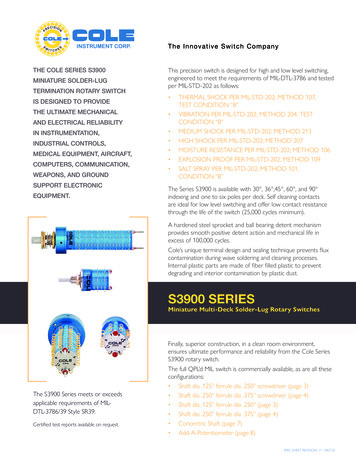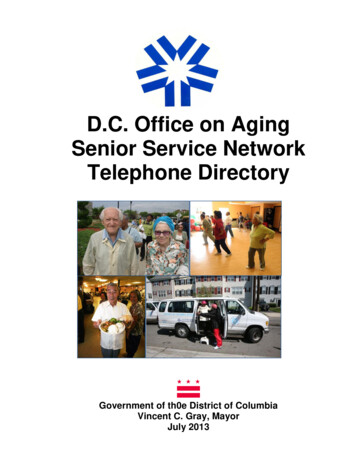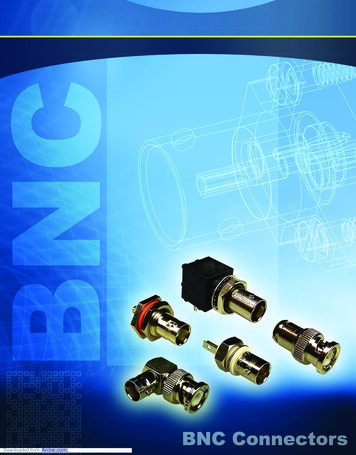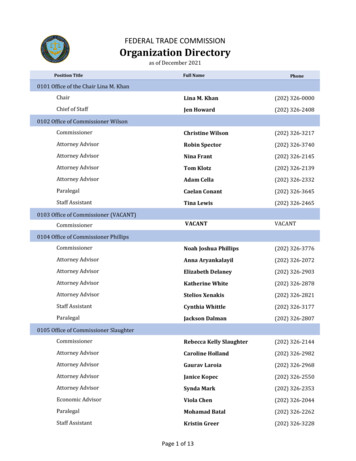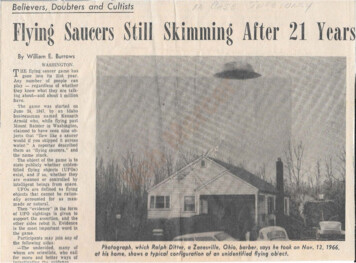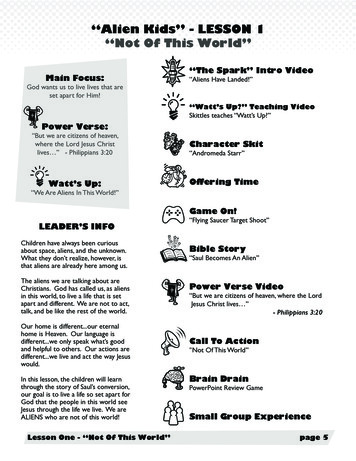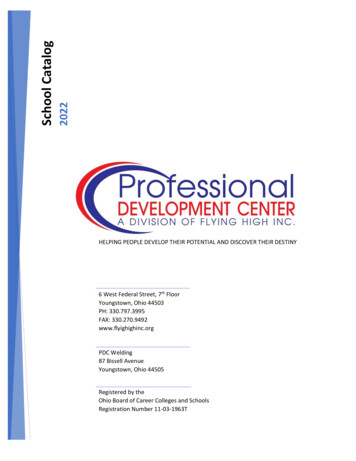
Transcription
School Catalog2022HELPING PEOPLE DEVELOP THEIR POTENTIAL AND DISCOVER THEIR DESTINY6 West Federal Street, 7th FloorYoungstown, Ohio 44503PH: 330.797.3995FAX: 330.270.9492www.flyighighinc.orgPDC Welding87 Bissell AvenueYoungstown, Ohio 44505Registered by theOhio Board of Career Colleges and SchoolsRegistration Number 11-03-1963T
Catalog publication date: January 2022Revised: 05.01.2022i
2022 Class ScheduleHEALTHCARESTNAJan 10 – Feb 3, 2022Feb 28 – Mar 24, 2022May 16 – Jun 10, 2022Aug 22 – Sep 16, 2022Oct 31 – Nov 29, 2022CDCAJan 4 – Feb 25, 2022; Intro Class Dec 14, 15, 16, 2021Mar 8 – Apr 29, 2022; Intro Class Mar 1, 2, 3May 31 – Jul 1, 2022: Intro Class May 24, 25, 26Jul 26 – Sep 16 2022; Intro Class Jul 19, 20, 21Sep 20 – Nov 10, 2022; Intro Class Sep 13, 14, 15Nov 15, 2022 – Jan 6, 2023: Intro Class Nov 8, 9, 10ADVANCED MANUFACTURINGWelding Advanced – Scheduled individuallyWelding Basic: Nov 30, 2021 – Mar 25, 2022Boot Camp: Nov 22, 23, 29, 2021Welding Basic: Feb 17 – Jun 9, 2022Boot Camp: Feb 2, 3, 9, 2022Welding Basic: Apr 5 – Jul 27, 2022Boot Camp: Mar 28, 29, Apr 1, 4, 2022Welding Basic: May 24 – Sep 19, 2022Boot Camp: May 16, 17, 20, 23, 2022Welding Basic: Jul 19 – Nov 8, 2022Boot Camp: Jul 11, 12, 18, 2022Welding Basic: Oct 12, 2022 - Feb 15, 2023Boot Camp: Sep 29, Oct 5, 6, 2022Welding Basic: Nov 22, 2022 – Mar 28, 2023Boot Camp: Nov 14, 15, 21, 20222022 Holidays (School Closed)New Year’s DayMartin Luther King DayPresident’s DayGood FridayEaster MondayMemorial DayIndependence DayLabor DayVeterans DayThanksgivingChristmasJanuary 1stJanuary 17thFebruary 21stApril 15thApril 18thMay 30thJuly 4thSeptember 5thNovember 11thNovember 24thDecember 23rd & 26th
Table of ContentsMission and Objectives . 5Standards of Academic Progress for Federaland State Financial Aid Programs . 12Our Mission . 5Other Financial Assistance Available toStudents . 12Our Objectives . 5PDC Scholarship Fund . 12School History . 5Refund and Cancellation Policies. 12Admissions Process . 5Cancellation and Settlement Policy . 12Entrance Requirements . 5Refund Policy . 13Career Tracks . 5Course Listing. 14Program Accreditation / Approval . 510-101 State Tested Nurse Aid (STNA) . 14Sequence of Classes . 6Transfer of Credits . 611-101 Chemical Dependency CounselorAssistant (CDCA) . 14Graduation Requirements . 612-101 Welding (Basic) . 15Student Code of Conduct . 612-102 Welding (Advanced) . 15Student Conduct Policy . 6Schedule of Fees . 15Substance Use Policies . 7Faculty and Staff . 16Academic Standards. 9Attendance Policy . 9Grading System . 10Termination for Unsatisfactory Attendance 10Termination for Poor Performance or Lack ofProgress. 10Make-up Work . 10Copyright Policy . 10Physical Requirements . 10Cell Phone Policy . 11Dress Code Policy . 11Re-entrance Policy . 11Professional Values . 11Student Services. 11Job Placement Services . 11Student Grievance Procedure . 12Financial Aid . 12Federal Financial Aid Programs. 124
Mission and ObjectivesOur MissionHelping people develop their potential anddiscover their destiny.Our Objectives Provide quality education and training for indemand industry professions that preparegraduates for entry into their career field. Offer support services to students at everystage of their experience – from the admissionprocess to their educational experience to postgraduate placement services. Create a culture that demonstrates thebenefits of teamwork, respect, andprofessionalism in a business/educationalsetting as part of the student’s educationalexperience. Comply with all external and internal laws,regulations, and policies governing theinstitution and in dealing with students andcolleagues. Create a community for students andcolleagues that empowers them withopportunities to transform their lives for abetter future and become productive,purposeful members of society.School HistoryThe Professional Development Center (PDC)was founded in March 2011 by Jeffrey Magadawho is the founder and executive director ofthe school’s parent organization, Flying HIGHInc. The school was born out of a need toprovide accelerated vocational training andprofessionalism skills that give individuals aspringboard to enter in-demand industrieswhere they can build a career.Today, in addition to vocational training, thePDC offers customized employment training,direct employment services, and access toemerging career pathways in our region.Admissions ProcessEntrance RequirementsWith an open-door policy, the minimumgeneral admission requirements are: at least age 18 completed registration application andscreening process demonstrate a commitment to achievegraduation requirements Registration feeo Advance Welding 100.00o Welding Basic 200.00o CDCA Phase I 100.00o STNA 90.00Students must demonstrate aptitude toparticipate in certain courses.Applicants to the STNA program must have ahigh school diploma or High SchoolEquivalency (HSE) certificate (formerly referredto as a GED).Career TracksA. State Tested Nurses Aid (STNA)B. Welding BasicC. Welding AdvancedD. Chemical Dependency Counselor Assistant(CDCA)Career TrackCDCASTNAWelding BasicWelding AdvancedAwardCertificate / Eligiblefor State LicenseCertificate / Eligiblefor State LicenseCertificateCertificateProgram Accreditation / ApprovalThe State Tested Nurse’s Aid Program has beenapproved by the Ohio Board ofHealth.The CDCA program meets the requirements ofthe Ohio Chemical DependencyProfessionals Board.5
Sequence of ClassesSTNA Program:STNA - Classes are scheduled concurrently in 5to 6-week terms.Welding Programs:Basic - Classes are scheduled concurrently in15-week termsAdvanced - Classes are scheduled concurrentlyin 6-week terms.CDCA Program:CDCA Phase I - Classes are scheduledconcurrently in 8-week terms.Transfer of CreditsGiven the purpose of the Professional DevelopmentCenter and that it is a clock hour program,Professional Development Center does not grantcredit for previous education, training, or experiencewith one exception.Exception: Opt-out credit hours will beconsidered for welding students who candemonstrate competency obtained throughtraining offered by the military, in theworkplace, through apprenticeships, or otherprograms. Upon demonstration ofcompetency, individuals will be exempt fromthe requirement of enrolling in and completingthe Welding Basic course, and the cost thereof,before enrolling in the Welding Advancedcourse.There are no limits as to how recently theindividual’s training was obtained. Individualsmust make a verbal request for and schedulean opportunity to demonstrate competency inorder to opt-out of the Welding Basic course asa prerequisite to the Welding Advancedcourse. A fair and comprehensive competencyevaluation is facilitated by the programinstructor(s) and will consist of performanceweld tests and an evaluation of the individual’sknowledge of basic industry concepts andterminology. Opt-out credit is approved by theinstructor in charge of the program and theSchool Director. Opt-out credit hours aregranted based on the level of skill andknowledge demonstrated. Documentation ofprior training (e.g. transcript, syllabi, courseoutlines, or catalog) is not required, but can besubmitted by the individual requesting opt-outcredit hours.Transfer Out Credits: Students will beprovided, upon request, documentation ofofficial documents such as transcripts, syllabi,or course outlines needed when requestingtransfer to other institutions.Graduation RequirementsTo be eligible for graduation and receive acertificate of completion, the student mustcomplete the clock hours for the programwith the minimum of an 80% average, meetthe attendance requirements for thetraining, successfully complete all elementsof the externship or field experience, ifrequired, and be current with all financialobligations to the school.Students are subject to the graduationrequirements that are in effect at the datewhen they first enroll at ProfessionalDevelopment Center. If graduationrequirements are subsequently changed,students have the option of graduating underthe later requirements.Student Code of ConductStudent Conduct PolicyThe following behaviors by a student, or anyguest of a student, whether acting alone or withany other persons, violate the policy on studentconduct:1. Conduct that threatens or endangersthe mental health, physical health orsafety of any person or persons, orcauses actual harm, including but notlimited to physical harm or threat ofphysical harm such as physical abuse,sexual assault or coercion, harassment6
2.3.4.5.6.7.8.9.10.11.12.and intimidation, whether physical,verbal (oral or written) or nonverbal.Dishonest conduct including plagiarism,forgery, alteration, fabrication,dishonesty or misuse of identificationcards, records, grades, diplomas, collegedocuments, or misrepresentation of anykind to a college office or official.Disorderly conduct that interferes withthe rights of others.Intentional or reckless disruption orinterference with the activities of theschool or its members.Theft of personal or school property orservices, or illegal possession or use ofstolen property.Vandalism, that is, intentional or recklessdamage to personal or school property.Unauthorized entry, use, or occupationof school facilities or the unauthorizeduse of equipment.Illegal purchase, use, possession ordistribution of alcohol, drugs, or othercontrolled substances.Failure/refusal to comply with areasonable request from a school officialacting within the scope of his/herduties.Unauthorized possession or use offirearms, explosive devices, fireworks,dangerous or illegal weapons, orhazardous materials. Interferencewith or misuse of fire alarms,elevators, or other safety and securityequipment or programs, including butnot limited to initiating, or causing tobe initiated, any false report, warningor threat of fire, explosion or otheremergency.Violation of a condition or sanctionimposed (or agreed upon) due to aviolation of the policy on studentconduct.Violation of any federal, state or locallaw that poses a threat to the health,safety or well-being of others.Students are entitled to equal care and fairnessin the application of the policy on studentconduct. Thus, the school takes into accountthe interests of all parties in order to reach afair resolution. Each party has the right to beinformed of his or her rights through receipt ofa copy of this policy. Each party has the right toreceive relevant information anddocumentation, including information that isfavorable to the student accused of a violationor that may indicate that he or she may not beresponsible. Each party has the right to ameaningful opportunity to be heard and torespond to the information and documentationpresented.Substance Use PoliciesThe Professional Development Center iscommitted to maintaining a drug and alcoholfree environment for students and employees.The PDC is a division of Flying HIGH Inc. whosemission it is to provide opportunities for allpeople to develop their potential and discovertheir destiny. Substance abuse, therefore, inany form, is incompatible with that mission andthe objectives of PDC programs. What followsprovides guidelines for admission to andparticipation in PDC training programs withregards to controlled substance use. All candidates for vocational trainingprograms must produce a negative drugscreen prior to admission.All participants in vocational trainingprograms will be drug tested randomlythroughout the program and mustconsistently produce negative screensin order to continue participating.Students who test positive forcontrolled substances whileparticipating in a vocational trainingprogram will be removed from thecurrent program. They can be referredto FHI/NAT or other SUD treatmentprograms.7
The illegal use, sale, manufacture,possession, distribution, transfer,purchase, or storage of drugs oralcoholic beverages on campuspremises, or in a vehicle parked oncampus premises is prohibited. Aviolation of this policy will result inappropriate disciplinary action up toand including removal from the currentprogram in which the student isenrolled, even for a first offense.Violations of the law will also bereferred to the appropriate lawenforcement authorities.Candidates who are not admitted tovocational training programs or who havebeen removed from a training program dueto a positive screen should continue towork with their case manager andparticipate in other workforcedevelopment and readiness activities untilthey are ready for vocational training oremployment.CDCA & STNA Candidates ChemicalDependency Counselor Assistant and StateTested Nurse Aide training candidates musthave a minimum of one year abstinence. Thisincludes abstinence from medical marijuanaand medically assisted treatment substances.Welding Candidates Before admission to theWelding program, candidates with a recenthistory of addiction must have completed allgroup therapy treatment programs in whichthey are participating (IOP and Non-intensiveOutpatient (Aftercare), etc.) and must havecontinuous, sustained sobriety for a period ofat least 3 months after the completion of thetreatment program(s). Candidates will then beassessed by FHI NAT staff and a professionalrecommendation will be sought as to whethercandidate is ready for training or requiresmore treatment. Candidates must alsoprovide evidence of connection with andactive participation in a recovery community(sponsor, home group, meetings, etc.).Medical Marijuana & Medically AssistedTreatment Many employers in the AdvancedManufacturing and Healthcare industries haveexpressed that they will not hire individualswho are participating in a MAT treatmentprogram or use medical marijuana, largely dueto safety and liability issues. Therefore, theProfessional Development Center hasestablished policies that provide, for individualsin those situations, a pathway to eliminatethose barriers and achieve their educationgoals. They are as follows: Candidates with a current medicalmarijuana card who test positive formarijuana will not be admitted tovocational training programs.Candidates with a current medicalmarijuana card who are actively usingbut wish to be considered for trainingprograms must first produce a cleanUDS and commit to remaining abstinentfor the training period and beyond, asjob placement and maintenancedepend on it. Candidates can bereferred for NAT counseling and/or theNAT Marijuana Cessation Program.Candidates who are currentlyundergoing medically assistedtreatment (MAT), in most cases, will notbe admitted to vocational trainingprograms. Since the effects on anindividual’s functionality differs withthe type of MAT they are on, there maybe exceptions to this policy. Here aresome guidelines:o Candidates participating inMethadone treatment will not beconsidered for vocational trainingprograms. Candidates can bereferred to the FHI/NAT MAT8
ooTapering Program or any other MATtapering program.Candidates participating inmedically assisted treatmentinvolving any form of Suboxone willnot be considered for vocationaltraining programs. Candidates canbe referred to the FHI/NAT MATTapering Program or any other MATtapering program.Candidates participating in Vivitrol(28-day shot) treatment will beconsidered for admission but musthave had continuous sustainedsobriety for a period of at least 6months and must provide evidenceof connection with and activeparticipation in a recoverycommunity (sponsor, home group,meetings, etc.) Candidates can bereferred to the FHI/NAT MATTapering Program or any other MATtapering program.Employment Barriers Students should also beaware that the use of medical marijuana orlegally prescribed medically assisted treatment(MAT) drugs can impact opportunities foremployment and job retention. The NationalSafety Council states that employers in safetysensitive industries, such as AdvancedManufacturing and Healthcare, are more likelyto have zero-tolerance policies when it comesto marijuana or other prescribed drug use.Marijuana can affect depth perception, reactiontime, coordination and other motor skills, andcreate sensory distortion. For someoneoperating machinery or caring for others, theseeffects can be deadly.Academic StandardsAttendance PolicyClock Hour Programs: Courses offered throughthe Professional Development Center are clockhour courses. Clock hours are the total numberof actual hours per week a student spendsattending class or other instructional activitiesthat count toward completing a program ofstudy. Attendance is particularly important inclock hour courses, as you cannot fulfill therequirements for a full course of study unlessyou participate in instruction.Students are expected to be in attendance andon time every day. You will be responsible forany missed class information. Please do notallow lateness or absences to have a negativeimpact on your success. Accommodations aremade for students who are absent becausethey are disabled or because of their religiousbeliefs. Each student who is absent fromschool because of a disability or religiousbeliefs will be given an equivalent opportunityto make up any examination, study or workrequirements which the student may havemissed because of such absence on anyparticular day or days. No fees of any kind shallbe charged for making such accommodations.STNA Students. In order to be certified, STNAstudents are required by the state tocomplete 16 hours of clinical training. Clinicalhours are scheduled prior to the start of thecourse and students are made aware of datesand times. Should a student be late to orabsent from the scheduled clinicals, they willbe required to pay the rate of 25.00 per hourfor each hour that is missed in order tocomplete their clinical requirement. (Forexample, if a student is 2 hours late to aclinical, they must pay 50.00 to make up thetime missed.) Certificates will not be awardeduntil payments are made in full and clinicalhours are completed.Any time you will be late or absent, youare expected to call 330.208.2322.9
According to our Attendance Policy, there arethree legitimate reasons for missing a class:1. Serious illness requiring medicalattention, subject to verificationfrom a physician;2. Death in the immediate family, subject toverification;3. Meetings with a Probation Parole Officer orcourt hearing. (An official letterdocumenting a meeting with a PO must bepresented to your instructor.)Grading SystemStudents must maintain at least an 80%average to pass. Passing criteria for laboratorywork done by welding students will beprovided by the instructor.Termination for UnsatisfactoryAttendanceUpon reaching a total of 1 unexcused absence,the student will be placed on academicprobation. Excused absences may not exceedthe maximum number of hours designated forthe program. All excused missed hours mustbe made up to be considered for graduation.More than one unexcused absence ortardiness or missed hours that exceed themaximum number of excused absences willresult in the student being dropped from theprogram.Termination for PoorPerformance or Lack of ProgressA student who fails to maintain a satisfactoryaverage grade (see Grading System below) willeither be (a) dropped from the program or (b)required to repeat their program of study.Evaluation of performance is based upon classattendance and the grade average earned viahomework, quizzes, exams, and practicums.Students are permitted a period of 2 days,following completion of the classes, to submitcompleted assignments required forgraduation. After a period of 2 days, if suchrequirements are left unfulfilled, the studentwill be withdrawn from candidacy forgraduation.Make-up WorkYou are expected to complete all assignedwork. Absences from classes for any reasonwill not excuse you from completing theassigned work on time. Make-up work can becompleted on assigned make-up day(s). Allmake-up work for an absence must becompleted and turned in to the class instructoron the assigned make-up day(s).Copyright PolicyThe Professional Development Center (PDC)does not allow or condone the use of PDCresources for the unauthorized distribution ofcopyrighted material, including peer-to-peer filesharing. Such activity will result in disciplinaryaction and may also subject individualsincluding students, faculty, and staff to civil andcriminal prosecution.Summary of Civil and Criminal Penalties forViolation of Federal Copyright Laws. Copyrightinfringement is the act of exercising theexclusive rights of the copyright owner withoutpermission or legal authority. These rights aredocumented under section 106 of the CopyrightAct (Title 17 of the United States Code). Theyinclude the right to reproduce or distribute acopyrighted work. In the file-sharing context,uploading or downloading substantial parts of acopyrighted work without permissionconstitutes an infringement.Physical RequirementsStudents must be physically able to completethe work required during classroom trainingand clinicals. This includes, but is not limited to,10
standing for extended periods of time andlifting or moving up to 50 pounds. If a studententering a program is pregnant or becomesaware that she is pregnant during the course ofthe program, she must inform the schooladmissions staff and present a written doctor’srelease stating that it is safe for her to continuewith the training.Cell Phone PolicyUse of personal cell phones or other electronicdevices is prohibited during class time.Dress Code PolicyStudents are expected to adjust their clothingto professional standards.STNA Dress Code:STNA students must wear medical scrubs.This includes clinical shoes, which should beclean, closed toe nursing or athletic shoes.The same attire is required in the classroom,at clinicals, and on the day students take thestate licensing exam.CDCA Dress Code:Classroom attire should be business casual,modest in length and coverage, distractionfree. Field experience attire should be adjustedto the professional standard of the agency atwhich the field experience is done. At the veryminimum, this means business casual.Welding Laboratory Dress Code: Long pants that reach from the waist tothe ankles. Long sleeve cotton shirt or t-shirt underleather sleeves (t-shirt must have sleeves) Steel-toed shoes or bootWelding Classroom Dress Code:Attire modest in length, coverage, anddistraction free. Students are required to wearpants that cover waist to ankle, closed toeshoes, and a shirt that covers the torso.Not Permitted: No facial jewelry of any kind, no noserings, facial piercing, tongue rings, etc.; only one set of earrings, no multipleearrings per ear.Clothing, accessories, symbols, jewelry, orother paraphernalia that may beconsidered obscene or offensive are notpermitted.No shorts, tank tops, muscle shirts, orsandals are permitted.Sagging or baggy pants, sweatpants, andwarm up suits are not permitted.Headwear, other than a ball cap or watchcap, is not permitted.Re-entrance PolicyStudents who have interrupted theireducation for any reason may requestreinstatement by contacting the Director.Students who were dismissed due tounsatisfactory progress may only beadmitted with the approval of the Directorand may have special conditions placed ontheir reentry. All students requestingreinstatement will be required to gothrough a portion of the admission processagain.Professional Values1. I will be on time.2. I will become smarter and remainteachable.3. I will work.4. I will have a professional image.5. I will respect myself and others.6. I will be drug-free.7. I will have a valid driver’s license.8. I will obtain an education that leads to acertification.9. I will be self-sufficient.10. I will fulfill my life’s mission.Student ServicesJob Placement ServicesThe Professional Development Center’s jobplacement services assist students indiscovering available job openings in theirchosen field. We do not guaranteeemployment upon graduation, instead weguide students to job positions where they11
will have the best opportunity to achieveemployment for themselves.Student Grievance ProcedureStudents seeking to resolve problems orcomplaints should first contact their instructor.Students who feel their complaint has notbeen adequately addressed should contact theDirector. Flying HIGH, Inc. ProfessionalDevelopment Center is registered with theOhio Board of Career Colleges and Schools.Students have the right to contact the StateBoard:Ohio State Board of Career Colleges andSchools30 East Broad Street, Suite 2481Columbus, Ohio, 43215Phone: 614-466-2752Toll free: 877-275-4219Financial AidFederal Financial Aid ProgramsThe Professional Development Center does notcurrently offer federal or state financial aidprograms.Standards of Academic Progressfor Federal and State FinancialAid ProgramsThe Professional Development Center does notcurrently offer federal or state financial aidprograms.Other Financial AssistanceAvailable to Students1. Students can apply to receive tuitionassistance through Ohio Means Jobs. ThePDC is an eligible training provider throughthe Area 17 Work Force Investment Board.2. Students can apply for tuition assistancethrough the Bureau of VocationalRehabilitation. The PDC has been approvedto receive VR authorizations for trainingservices from Ohio Rehabilitation Servicesfor individuals with disabilities.3. Students receiving assistance throughMahoning County Job & Family Serviceswho have children under 18 in their carecan apply for tuition assistance through thePrevention, Retention and Contingency(PRC) Program.4. Students can apply to receive tuitionassistance through Flying HIGH Inc.’sMahoning Valley Partnership forEmployment Project.All financial assistance listed above hasspecific eligibility requirements andapplication process. Students must meeteligibility criteria and complete theirapplication process to receive funding.See PDC staff for assistance.PDC Scholarship FundThe Professional Development Center offersscholarships to deserving students who haveincome within 200% of the federal povertyguidelines. Students will be screened forscholarships eligibility after enrollment. Thenumber and amount of scholarships awardedfor each term will depend on the total amountin the scholarship fund.Refund and Cancellation PoliciesCancellation and SettlementPolicyIf the institution cancels a program prior to thestart date of the classes, a full refund of allmonies paid by the student will be issued.If an applicant, accepted by the institution,cancels prior to the start of scheduled classesor never attends class (no show), a refund ofall monies paid, less a maximum registrationfee of 200 will be issued.The institution will consider a withdrawalduring or after a course bootcamp/12
introduction, or during the first week ofcourses that do not have a bootcamp, as acancellation or no show. Under this condition,a refund of all monies paid, less a maximumregistration fee of 200 will be issued.If a student cancels the enrollment agreementwithin five calendar days after the date ofsigning and notifies the school either verballyor in writing of the cancellation, the school willrefund in full all tuition and fees paid pursuantto the enrollment agreement and the refundshall be made no later than thirty days aftercancellation. This provision shall not apply ifthe student has already started classes.Refund Policy If the student is not accepted into thetraining program, all monies paid by thestudent shall be refunded. Refunds for books, supplies and consumablefees shall be made in accordance with OhioAdministrative Code section 3332-1-10.1. The school shall make the appropriate refundwithin thirty days of the date the school isable to determine that a student haswithdrawn or has been terminated from aprogram. The refund shall be calculatedusing the last date of attendance and be paidwithin thirty (30) calendar days from thedocumented date of determination. Thedate of determination is the date thestudent gives written or verbal notice ofwithdrawal to the school or the date theschool terminates the student. Refunds shallbe based upon the last date of a student’sattendance or participation in an academicschool activity.Refund Provisions Established by the OhioBoard of Career Colleges and Schools(1) A student who withdraws before the firstclass shall be obligated for the registrationfee. If, however, the student withdrawsbefore the first class and within fiveca
Youngstown, Ohio 44503 PH: 330.797.3995 FAX: 330.270.9492 www.flyighighinc.org PDC Welding 87 Bissell Avenue Youngstown, Ohio 44505 . D. Chemical Dependency Counselor Assistant (CDCA) Career Track Award CDCA Certificate / Eligible for State License STNA Certificate / Eligible
